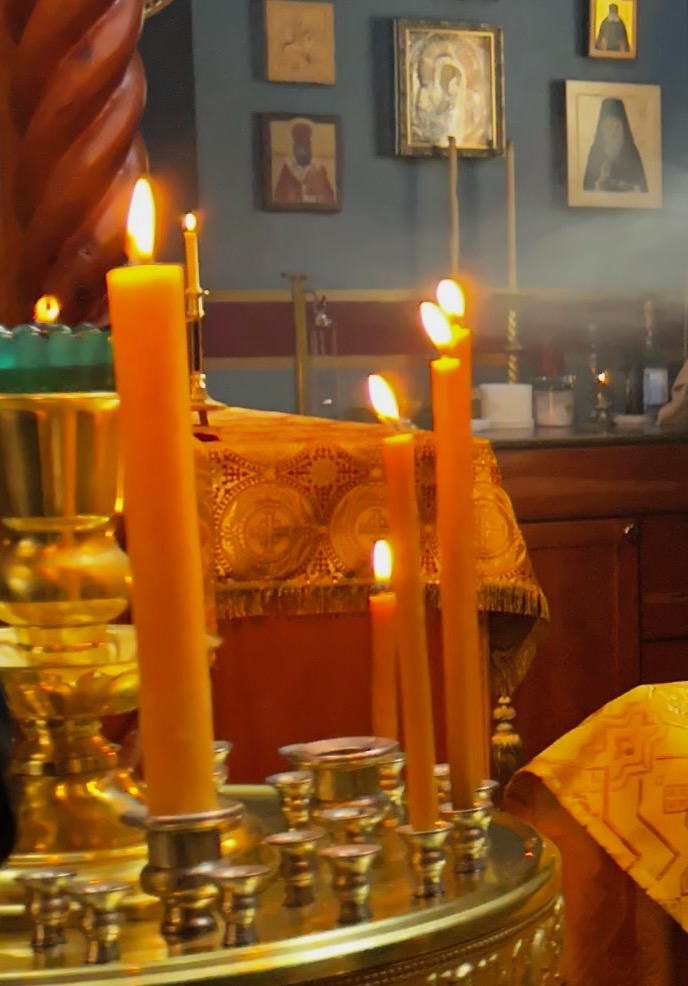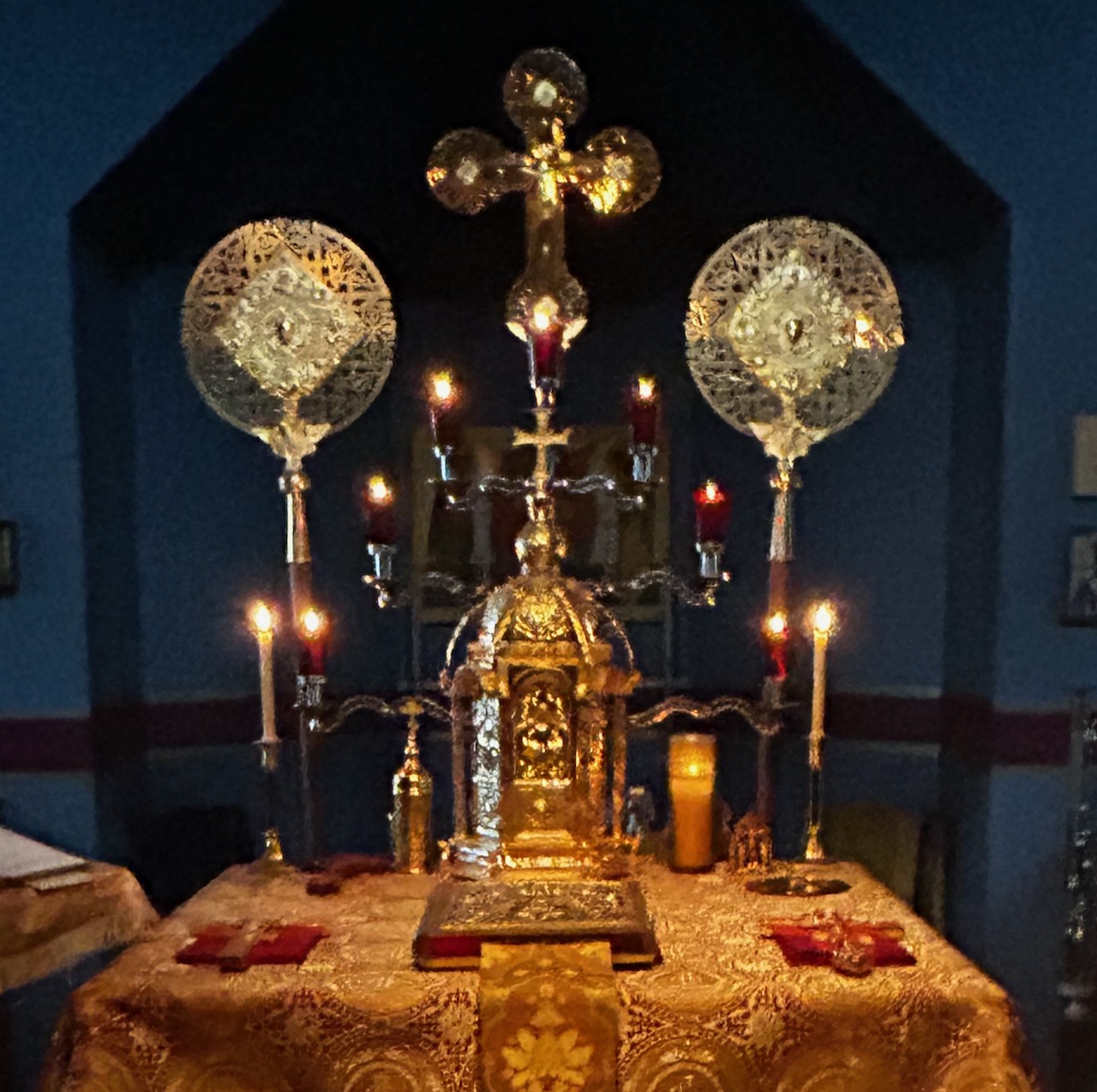The Candles Represent the Light of Christ

The Orthodox Church from its very inception has always used oil lamps (or lampadas) and candles during its worship and prayers. The burning of candles and oil lamps have always been the traditional source of lighting in God’s churches, and we must forgo the artificial light that comes from electricity.
Candles and oil are offered to God from material goods that He has given us, as pure beeswax, because bees make the wax by collecting the pollen from various flowers. For this reason, some of the saints have taught that a candle reminds us of not only how hard-working the bee is but also the fact that it collects the good and rejects the polluted. Furthermore, the Church has taught that the use of pure beeswax candles produced by virgin bees represents the human nature of Christ which came from the Holy Virgin Mary.
But first and foremost, the candle represents the Light of Christ in our midst, because, as it burns, it illuminates the darkness. Candles represent the deification of our souls because the candle is mixed with fire, representing the Light of Christ. They represent the love and peace which are attributes each Christian should have because the candle burns and comforts everyone with its light in the darkness. Lighting a candle reminds us we must remember to live in the light we received with our baptism.
This light is renewed every time we participate in the Divine Liturgy, every time we receive the Holy Mysteries, and every time we offer prayers. At the end of every celebration of the Divine Liturgy we sing: “We have seen the True Light! We have received the Heavenly Spirit! We have found the True Faith! Worshiping the Undivided Trinity, Who has saved us.” The candle also reminds us of how Fire, that is, the Triune Deity Himself, unites with the malleable soul and then softens and illuminates both it, and all those who come into contact with it.
When we as Christians sacrifice ourselves for the love of God, we enlighten our fellow human beings and show them the way of salvation. And just as the candles we light at the baptism represent the spiritual light received by the newly baptized person, so too the candles we hold and light during funerals, at memorial services, and those placed on the tomb of the reposed represent the light of Christ, which we wish the deceased receive.
Just as we light candles for the living and the dead we should always accompany them by offering words of prayer. For the living we ask for God’s mercy and protection. For the dead we ask for God’s compassion and eternal rest.
With love in Christ,
Abbot Tryphon

Tuesday January 31, 2023 / January 18, 2023
34th Week after Pentecost. Tone eight.
St. Athanasius the Great (373) and St. Cyril (444), archbishops of Alexandria.
Venerable Cyril, schemamonk, and Venerable Maria, schemanun (1337) (parents of St. Sergius of Radonezh).
New Hieromartyr Michael priest (1919).
New Hieromartyr Eugene priest (1930).
New Hieromartyrs Vladimir, Nicholas, Sergius Alexander priests (1938).
Venerable Athanasius, abbot of Syanzhema (Valaam) (1550).
Venerable Athanasius of Novolok, monk (16th-17th c.).
Venerable Marcian of Cyrrhus in Syria, monk (ca. 303).
Martyr Xenia.
St. Maximus of Serbia, metropolitan (1516) (Serbia).
Venerable Silvanus, of Palestine, monk.
St. Leobardus of Marmoutier (6th c.) (Gaul).
Martyr Theodula and her companions Helladius, Boethius, Evagrius and Macarius of Anazarbus in Cilicia, (304).
St. Ephraim the Lesser, the Philosopher (1101) (Georgia).
Venerable Hieromonk Alexi (Shushania) of Teklati (1923) (Georgia).
St. Joachim, patriarch of Turnovo (1235).
St. Ninnidh of Inismacsaint (6th c.) (Celtic & British).
The Scripture Readings
1 Peter 3:10-22
10 For
“He who would love life
And see good days,
Let him refrain his tongue from evil,
And his lips from speaking deceit.
11 Let him turn away from evil and do good;
Let him seek peace and pursue it.
12 For the eyes of the Lord are on the righteous,
And His ears are open to their prayers;
But the face of the Lord is against those who do evil.”
Suffering for Right and Wrong
13 And who is he who will harm you if you become followers of what is good? 14 But even if you should suffer for righteousness’ sake, you are blessed. “And do not be afraid of their threats, nor be troubled.” 15 But sanctify the Lord God in your hearts, and always be ready to give a defense to everyone who asks you a reason for the hope that is in you, with meekness and fear; 16 having a good conscience, that when they defame you as evildoers, those who revile your good conduct in Christ may be ashamed. 17 For it is better, if it is the will of God, to suffer for doing good than for doing evil.
Christ’s Suffering and Ours
18 For Christ also suffered once for sins, the just for the unjust, that He might bring us to God, being put to death in the flesh but made alive by the Spirit, 19 by whom also He went and preached to the spirits in prison, 20 who formerly were disobedient, when once the Divine longsuffering waited in the days of Noah, while the ark was being prepared, in which a few, that is, eight souls, were saved through water. 21 There is also an antitype which now saves us—baptism (not the removal of the filth of the flesh, but the answer of a good conscience toward God), through the resurrection of Jesus Christ, 22 who has gone into heaven and is at the right hand of God, angels and authorities and powers having been made subject to Him.
Mark 12:18-27
The Sadducees: What About the Resurrection?
18 Then some Sadducees, who say there is no resurrection, came to Him; and they asked Him, saying: 19 “Teacher, Moses wrote to us that if a man’s brother dies, and leaves his wife behind, and leaves no children, his brother should take his wife and raise up offspring for his brother. 20 Now there were seven brothers. The first took a wife; and dying, he left no offspring. 21 And the second took her, and he died; nor did he leave any offspring. And the third likewise. 22 So the seven had her and left no offspring. Last of all the woman died also. 23 Therefore, in the resurrection, when they rise, whose wife will she be? For all seven had her as wife.”
24 Jesus answered and said to them, “Are you not therefore mistaken, because you do not know the Scriptures nor the power of God? 25 For when they rise from the dead, they neither marry nor are given in marriage, but are like angels in heaven. 26 But concerning the dead, that they rise, have you not read in the book of Moses, in the burning bush passage, how God spoke to him, saying, ‘I am the God of Abraham, the God of Isaac, and the God of Jacob’? 27 He is not the God of the dead, but the God of the living. You are therefore greatly mistaken.”
